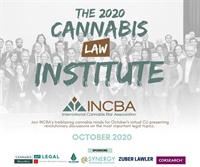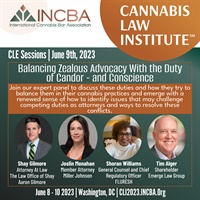
- Average Rating:
- Not yet rated
- Bundle(s):
- CLI2023 On-Demand
- Categories:
- Ethics | Mindfullness | Specialty Credits
- Faculty:
- Joslin E. Monahan | Shoran Williams | Timothy L. Alger | Mr. Shay Aaron Gilmore
- Duration:
- 1 Hour 9 Minutes
- Format:
- Audio and Video
- SKU:
- INCBA072023candorOD
- License:
- Access for 6 month(s) after purchase.
- Short Description:
- As the cannabis industry grows and more states allow cannabis licensing, the ethical duties that cannabis attorneys must balance have grown more complicated. These ethical duties require lawyers to balance and re-evaluate their duty to zealously advocate for their clients with the duty of candor, their duties to all of their cannabis clients – and, at times, their belief systems and why they entered cannabis law originally. Join our expert panel to discuss these duties and how they try to balance them in their cannabis practices and emerge with a renewed sense of how to identify issues that may challenge competing duties as attorneys and ways to resolve these conflicts.
- Price:
- $30.00 - $75.00
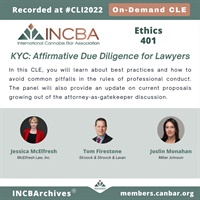
- Average Rating:
- 3
- Bundle(s):
- CLI2022 On-Demand | INCBA’s Cannabis Law Crash Course Bundle
- Categories:
- Business of Law | Mindfullness | Regulations
- Faculty:
- Jessica C. McElfresh | Joslin E. Monahan | Tom Firestone
- Duration:
- 1 Hour 25 Minutes
- Format:
- Audio and Video
- SKU:
- INCBA072022KYCOD
- License:
- Access for 6 month(s) after purchase.
- Short Description:
- In this CLE, you will learn about best practices and how to avoid common pitfalls in the rules of professional conduct. The panel will also provide an update on current proposals growing out of the attorney-as-gatekeeper discussion.
- Price:
- $30.00 - $75.00
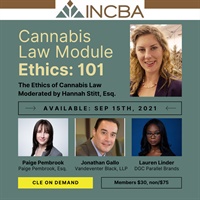
- Average Rating:
- 2
- Categories:
- Business of Law | Cannabis | Ethics | Hemp | Litigation | Mindfullness | Social Equity | Substance Abuse
- Faculty:
- Hannah Stitt | Paige Pembrook | Jonathan Gallo | Lauren Linder
- Duration:
- 48 Minutes
- Format:
- Audio and Video
- SKU:
- INCBA08122021OD
- License:
- Access for 6 month(s) after purchase.
- Short Description:
- After becoming a cannabis lawyer, you need to ensure you are an ethical one. Learn from our panelists about the issues they confronted as soon as they entered cannabis practice, and what they never expected.
- Price:
- $30.00 - $75.00
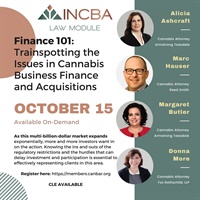
- Average Rating:
- 3
- Categories:
- Business of Law | Cannabis | Ethics | Hemp | Litigation | Mindfullness | Social Equity | Substance Abuse
- Faculty:
- Alicia Ashcraft | Marc Hauser | Margaret Butler | Donna More
- Duration:
- 1 Hour 3 Minutes
- Format:
- Audio and Video
- SKU:
- INCBA101521.101OD
- License:
- Access for 6 month(s) after purchase.
- Short Description:
- This panel of experienced practitioners will provide insight and guidance in spotting and trouble shooting the issues at the early stages of the evaluation and negotiation of cannabis business transactions.
- Price:
- $30.00 - $75.00
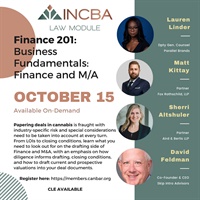
- Average Rating:
- 1
- Categories:
- Business of Law | Cannabis | Ethics | Hemp | Litigation | Mindfullness | Social Equity | Substance Abuse
- Faculty:
- Lauren Linder | Matthew Kittay | Sherri Altshuler | David Feldman
- Duration:
- 1 Hour 7 Minutes
- Format:
- Audio and Video
- SKU:
- INCBA101521.201OD
- License:
- Access for 6 month(s) after purchase.
- Short Description:
- From LOIs to closing conditions, learn what you need to look out for on the drafting side of Cannabis Business Finance and M&A
- Price:
- $30.00 - $75.00
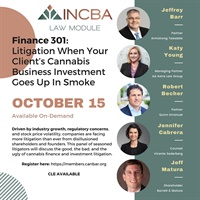
- Average Rating:
- Not yet rated
- Categories:
- Business of Law | Cannabis | Ethics | Hemp | Litigation | Mindfullness | Social Equity | Substance Abuse
- Faculty:
- Jeffrey Barr | Robert Becher | Jennifer Cabrera | Jeffrey Matura | Katy Young
- Duration:
- 1 Hour 2 Minutes
- Format:
- Audio and Video
- SKU:
- INCBA101521.301OD
- License:
- Access for 6 month(s) after purchase.
- Short Description:
- This panel of seasoned litigators will discuss the good, the bad, and the ugly of cannabis finance and investment litigation.
- Price:
- $30.00 - $75.00
- Average Rating:
- 4
- Categories:
- Specialty Credits | Ethics | Substance Abuse | Mindfullness | Ca. Competency Credit
- Faculty:
- Richard Carlton | Jeena Cho
- Duration:
- 57 Minutes
- Format:
- Audio and Video
- SKU:
- INCBA102720MIOD
- License:
- Access for 6 month(s) after purchase.
- Short Description:
- Jeena Cho will cover resilience, work/life integration, and wellness in the workplace. Her area of expertise includes women’s issues, diversity, wellness, productivity, mindfulness, and meditation. Richard Carlton will be covering substance abuse and depression disorders. He will dive into the relation between practicing law and the mentality necessary to "succeed" at practicing law.
- Price:
- $30.00 - $75.00
- Average Rating:
- 4
- Categories:
- Specialty Credits | Ethics | Substance Abuse | Mindfullness
- Faculty:
- Hannah Stitt | Patrick Nightingale | Bob Nichols | Andrew Kingsdale
- Duration:
- 1 Hour 10 Minutes
- Format:
- Audio and Video
- SKU:
- INCBA102720THOD
- License:
- Access for 6 month(s) after purchase.
- Short Description:
- Panelists will discuss how cannabis use and substance abuse issues can interfere with an attorney’s competence obligations, and mandatory reporting requirements.
- Price:
- $30.00 - $75.00
- Average Rating:
- 4
- Categories:
- Specialty Credits | Ethics | Substance Abuse | Mindfullness | Ca. Competency Credit
- Faculty:
- David Mann
- Duration:
- 1 Hour 8 Minutes
- Format:
- Audio and Video
- SKU:
- INCBA102720SUOD
- License:
- Access for 6 month(s) after purchase.
- Short Description:
- Of all white collar professionals in the United States, alcoholism and depression are most common among lawyers. And we serve an industry that makes an intoxicant more widely available than it has ever historically been. So, what does that mean for our own mental health and our own battles with substance abuse.
- Price:
- $30.00 - $75.00

Product Type

Product Type

